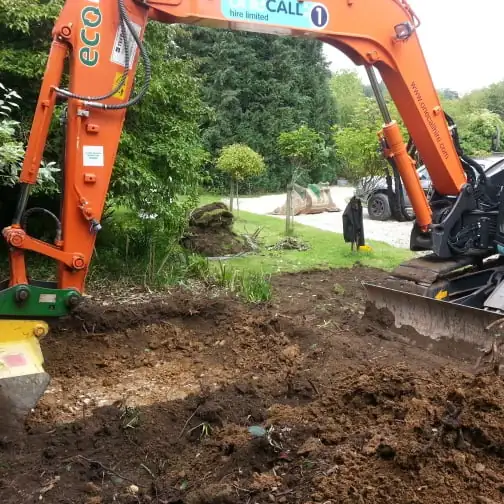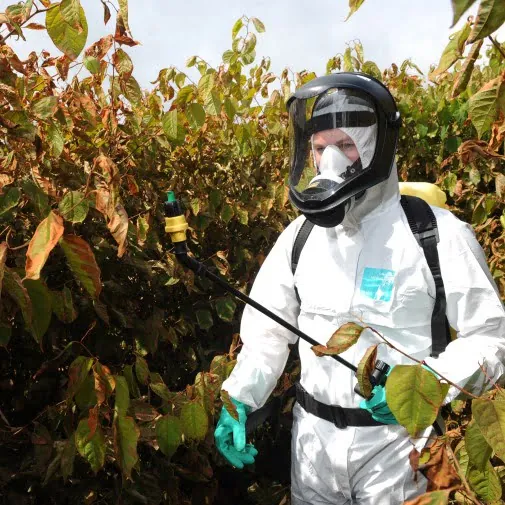Japanese knotweed removal
How to identify Japanese knotweed
Japanese knotweed is a fast-growing perennial with bamboo-like stems, heart-shaped or spade-shaped leaves, and small white flowers that bloom in late summer. It dies back in winter but regrows from underground rhizomes in spring. Recognising it early is crucial for effective control.
Accurate identification is crucial. Use our FREE identification service – simply send us a photo, and our experts will confirm if it’s knotweed. Additionally, our video and seasonal photo guide can help you spot it year-round.

Methods of Japanese knotweed removal

1. Physical Removal
Digging out Japanese knotweed is labour-intensive but can be effective if done correctly. All rhizomes must be removed, as even a small fragment can regrow. The excavated plant material is classified as controlled waste in the UK and must be disposed of at a licensed landfill site following Environment Agency regulations.

2. Chemical Control
Using herbicides containing glyphosate or similar active ingredients can weaken and eventually kill the plant. Treatments should be applied during the growing season and may require multiple applications over several years. In the UK, herbicide use must comply with Health and Safety Executive (HSE) regulations, and professional application may be required in some cases.

3. Biological Control
Research is ongoing into natural predators like the Japanese knotweed psyllid (Aphalara itadori), which feeds on the plant and may help reduce its spread. However, this method is not yet widely available for general use.
Eradicating Japanese knotweed usually requires specialist expertise, and even professionals avoid claiming 100% eradication due to the plant’s persistence. That’s why insurance-backed guarantees are so important.
DIY attempts often fail and make professional treatment more challenging and costly.
Specialists at Environet will recommend the best approach based on the infestation’s size, maturity, and site conditions. The right method will also depend heavily on what you want to do with the space afterwards and how long you are prepared to wait for the results.
Preventing regrowth
Since Japanese knotweed can regenerate from small root fragments, ongoing monitoring is essential. Any new shoots should be treated promptly. In the UK, it is illegal to allow the plant to spread into the wild under the Wildlife and Countryside Act 1981. Additionally, disturbing soil containing knotweed without proper disposal can lead to further spread and sanctions under the Environmental Protection Act 1990.

Cost of Japanese knotweed removal
The cost of removal depends on factors such as infestation size, site conditions, and the chosen method. Below is an indicative range of industry prices:
| Area affected | Lower limit | Upper limit |
|---|---|---|
| 5m | £2,100 | £12,000 |
| 25m | £3,250 | £30,000 |
| 50m | £4,000 | £60,000 |
For more details, read our guide to knotweed removal costs.
Legal considerations in the UK
- Wildlife and Countryside Act 1981: It is illegal to plant or allow the spread of Japanese knotweed in the wild.
- Infrastructure Act 2015: Local authorities can serve notices requiring landowners to control Japanese knotweed.
- Environmental Protection Act 1990: Knotweed waste is classified as controlled waste and must be disposed of legally.
- Property Sales and Mortgages: The presence of Japanese knotweed can affect property values, and sellers are required to disclose its presence in the TA6 Property Information Form.
Successfully removing Japanese knotweed requires persistence and a combination of methods. Due to UK legal requirements, professional help is usually necessary. Whether tackling it yourself or seeking expert assistance, early action is key to preventing long-term issues.

Japanese knotweed FAQs

The simple answer is Yes. You’re legally obliged to disclose whether the property is “affected” when selling and mortgage lenders will impose conditions that could prompt a buyer to renegotiate or even walk away. But don’t panic, a professionally prepared and actioned Japanese Knotweed Management Plan normally returns the value close to the “non-affected” value. Check out this online calculator to get an idea of how your property’s value might be impacted.
If you’re tempted to treat it yourself, consider these points:
- Most people attempting a DIY solution will fail, making subsequent professional treatment more complicated and expensive.
- Using chemicals purchased from a garden centre or DIY store will rarely be strong enough to kill the underground root system, and will often result in dormancy which means that even if the plant appears to be dead above ground, the underground rhizome remains very much alive ready to regrow at any moment.
- Killing Japanese knotweed with bleach,vinegar or diesel does not work!
- Burning Japanese knotweed is also not recommended, as you are not safe from regrowth, and may be open to other implications.
- Damage to other prized plants may be caused by poor herbicide application.
- DIY treatment won’t provide you with much of a legal defence if it spreads into your neighbours’ land.
- Digging out the rhizome system is difficult; it’s best left to professionals.
- You won’t get the all-important insurance-backed guarantee which could make it very difficult to sell your property in the future and adversely affect its value.
To determine the knotweed infected area in sq m on a subject property measure/approximate the length and breadth of the visible Japanese knotweed at ground level. Multiply the length x breadth to give you the total visible in sq m. As knotweed rhizome spreads laterally underground the actual area of infestation is greater than is visible above ground. A buffer zone is therefore added in each direction to the visible length and breadth of 1-2m or more in exceptional cases.
If there are 2 stands of Japanese knotweed within 2m of each other, it is likely that these are interconnected underground and should be classed as 1 stand when measuring the length and breadth.
That’s easy – just email us your pictures! Environet offers a free, same-day identification service. Just send us some close-up pictures to expert@environetuk.com and we’ll let you know if it’s knotweed you’re dealing with. Once we’ve checked the pictures, we can talk you through the next steps.
Japanese knotweed isn’t always visible to the naked eye, for example during winter when the plant dies back, or if it’s been herbicide treated in the past it may be lying dormant beneath the ground and could begin to regrow at any moment. Sometimes people try to deliberately conceal knotweed.
For this reason, it’s important to use an expert to determine whether your property is affected.
Why Choose Environet?
Market-Leading Guarantee
Receive an insurance-backed guarantee for up to 10 years, accepted by all major mortgage lenders
Flexible Solutions
Tailored removal methods for every property type
Expertise You Can Trust
PCA accredited professionals who care about their customers
What our clients say
Reviews
What our clients say
Reviews
Bernadette Spencer
“Richard was able to book us an assessment visit very quickly regarding the encroachment of evasive running bamboo in our garden .. Will completed the assessment visit,we found him to be very professional, but also friendly and easy to talk to. “
Kim
“I’d just like to take the time to commend the team I have spoken to already, in particular Rachel and Suzie – they have been so friendly, reassuring and informative which has really eased the stress around this situation. Thank you all for your time. .”
Ali Hamaad
“I used Environet following a recommendation to help with invasive Japanese Knotweed in my garden. Very professional, responsive and managed to co-ordinate with other contractors working on my property to remove the knotweed.”
L Schjolden
“I would like to commend your man Ed, who was in charge of the works at our property. He was a pleasure to deal with — punctual, polite, professional, responsible. He always kept me up to date with the progress of the works and made sure there was as little disruption to our lives as possible.”
Phil Smith
“This is a very professional operation; always just on the end of the phone. The whole team seemed to know exactly what was going on with the job. (and my neighbours were very happy too.)”
Case Studies

Resi-Dig-Out™, Bolton

Resi-Dig-Out, Suffolk

Dig & Dump, West Sussex

Resi-Dig-Out™, Runneymede

Resi-Dig-Out™, Cardiff

Resi-Dig-Out™, Thames Valley

Resi-Dig-Out™, Highgate

Resi-Dig-Out™, Bath

Excavation & treatment, Bridgend

Xtract™, Folkestone

Xtract™, Derby

Xtract™, Putney
GET IN TOUCH
Contact us
Our team of experts is available between 9am and 5:30pm, Monday to Friday to answer your enquiries and advise you on the next steps
Want a survey?
If you already know you have an invasive plant problem, you can request a survey online in less than two minutes by providing a few brief details. A member of the team will swiftly come back to you with further information and our availability.
Need quick plant identification?
Simply upload a few images of your problem plant to our identification form and one of our invasive plant experts will take a look and let you know, free of charge what you are dealing with. We’ll also be there to help with next steps where necessary.



